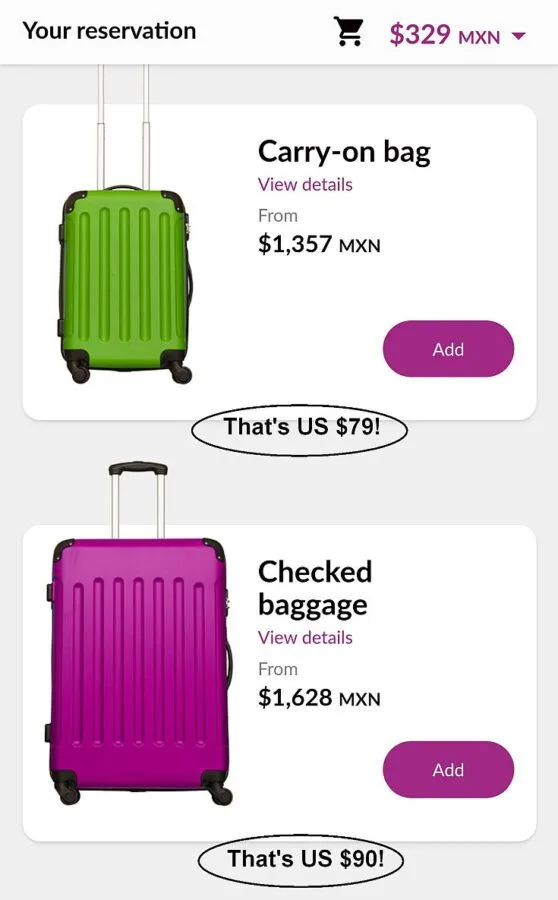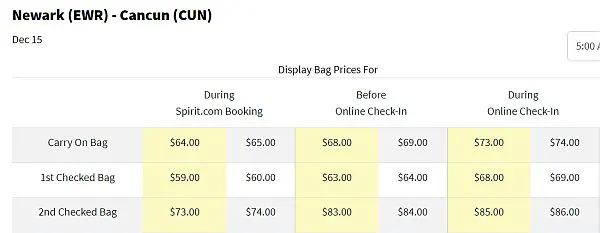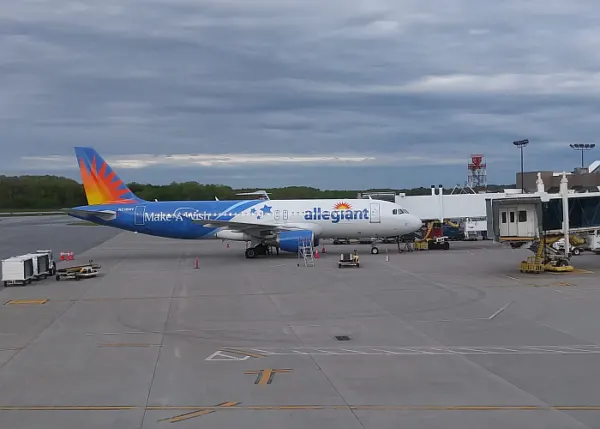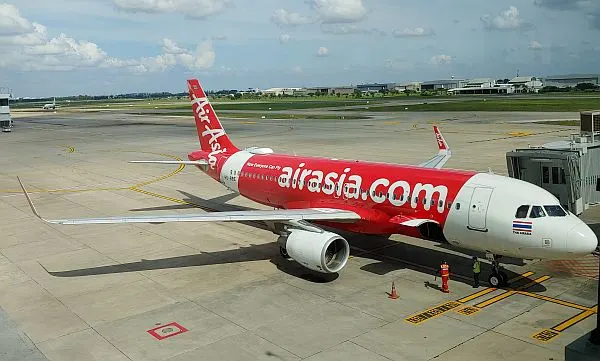[ad_1]
Would you board a flight for just the essentials for your trip if it could save you more than $200 to spend on your vacation? That was the question I had to ask myself recently when flying on a budget airline. By avoiding baggage fees with an underseat bag, I was able to cut my spending by that much and more.

It won’t say it was completely easy to do this. I layered some clothing, I took items I could wash in a sink when needed, and this limited what shoes I could bring. It was worth it to use that much money for something else though instead of handing it to a fee-happy budget airline.
There are some strategies and hacks that can help you with your luck in avoiding baggage fees with budget airlines, but most of them do require a little luck. One brazen one I’ve seen work is to check in online and just show up at the gate with a carry-on you didn’t pay for and board the plane with it. If the gate agents are harried enough or they’re not in the mood to play baggage cops, they’ll scan your boarding pass without paying attention and you can get away with it. If your agent is in a bad mood or there’s some monthly commission incentive going on for baggage revenue, you’re busted and you may need to pay $70, $100, or more.
A safer strategy is to put some items that don’t forget into a shopping bag and it looks like you just bought something at the airport. This is not considered baggage, especially since you have to bring your own food, common on these budget airlines. This can be useful if you’re carrying a purse that won’t fit into your underseat bag because otherwise that purse is your personal item and you’re now bringing two bags, not one.
A tried-and-true tactic is to, wear more than you need to wear. If you’ve got a Scottevest or a jacket with loads of pockets, you can stuff a lot of things into what you’re wearing and those are just part of your outfit, not baggage. Cargo pants are also great for this and since airports and planes are often cold anyway, it’s no biggie to add an extra shirt layer or wear a hat. You can always shed a few items on the plane and stick them in the overhead after boarding is almost done.
Some readers of this blog have told me about traveling with a big overcoat (with items hidden underneath), of taking items out for the sizer check and then stuffing them back in before boarding, or handing items to a friend that they’ll then get back.
Scroll down to the second half of this article for recommendations that will help you play by the rules though, with underseat bags that will help you avoid luggage fees if you can pack light enough.
Avoiding Baggage Fees on Volaris and Viva Aerobus
I took three international flights on Volaris recently between Mexico, Costa Rica, and Guatemala. Normally, the baggage fees on those flights are around $35 for a carry-on and $40 or so for a checked bag. Because I have the Volaris Annual Pass though, which I’ll write about later, they ream me by charging the same-day rate for luggage instead of the advance rate. When you purchase tickets with that pass, they don’t allow you to add luggage at the same time.
So when I went to add a bag to any of these flights, it was an outrageous, much higher charge they were asking me to pay. Take a look at this screenshot:

How insane are those prices! Keep in mind that I would be paying that three times for three flight legs, so the total would have been more than $230 just for the privilege of carrying my own bag onto the plane. That’s enough for a high-end suitcase with a lifetime warranty or a few outfits at your favorite chain retail store. So I said “No way” and traveled with just an underseat bag instead.
I pulled out a large laptop backpack, stuffed it with some clothing and charging cords, popped in my Kindle, and hit the road. Here’s how it went:
Note that I had a secret weapon on that trip that made things easier after arrival. I took a packable duffel bag that stuffed down into a little pouch. Once I arrived, I kept the laptop and electronics in one bag and put all my clothing in the duffel.
Volaris and Viva Aerobus compete on a lot of routes, so they tend to have similar fees and policies for baggage.
Avoiding Baggage Fees on Spirit Airlines and Frontier
The Spirit Air personal item size is officially a maximum of 18 inches by 14 inches by 8 inches. Or 40 linear inches and able to fit in to the rectangular sizer in the boarding area. It’s the same with Frontier.
As with the others, this is quite tight and where people get a nasty surprise is usually on that lowest number: the thickness of the bag. Pull out a ruler and 8 inches is not very much, especially if you have a laptop in there already.
Here’s how much Spirit Air is going to extract from you for baggage if you’re taking off on a vacation trip to the beach this winter. As I’ve said before, it’s not a simple decision to decide whether to check a bag or not: each case is different. Here’s one where it’s cheaper to check a bag and walk around the airport without dragging anything along than it is to schlep your own bag aboard—with less in it—and heave it up into the overhead bin.

What could you do with an extra $64 upon arrival though instead? If you can manage to pack what you need into an underseat bag, which is much more doable for a beach trip than an ski trip of course, then you’ve just saved that times two on a round-trip flight. Congrats, you now have $128 to spend on fun instead.
Frontier’s dimensions are the same and they’re likely to hit you up for similar amounts on the baggage fees. As with most of these budget airlines, Frontier can’t be transparent and consistent with their bag fees. That would be too convenient for the customers. Instead, the baggage charges are dynamic, meaning they’re going to charge as much as they feel like charging for every flight. You have to enter your name and confirmation number on this page to find out how much they are pickpocketing you for.
Avoiding Bag Fees on Allegiant

From my research, it looks like Allegiant has the strictest personal item policy of any airline out there, officially listing the max dimensions as 16 inches by 15 inches by 7 inches. That one less inch in the width could really trip a lot of people up and it’s not realistic since you really have far more room than that under the seat.
In my experience though, they’re not monitoring this bag by bag as you board the plane unless your bag is clearly over the limit or you’re carrying two or three items. I’ve flown Allegiant multiple times with and without paid luggage and in my experience, you’re less likely to be scrutinized if a) you’re only carrying one item and 2) you’ve paid for a seat assignment. That could just be correlation and not causation, but my theory is that they’re giving people who paid something a pass, whereas those who paid the fare only get a closer look.
Here’s my previous post on flying on Allegiant Airlines without baggage fees and I’ve duplicated that experience several times since. I’m guessing those bag fees are even pricier than I listed in that post, so the stakes are even higher now.
Underseat Baggage Size on Ryan Air, EasyJet, and Air Asia

For Europe and Asia, pull up a conversion calculator site because their bag size limits are in centimeters. For Air Asia, which you might fly around Southeast Asia, your personal item “must not exceed 40cm x 30cm x 10cm. This item must be able to fit under the seat in front of you. The various Thai domestic airlines won’t vary much from this since AirAsia is the market leader.
You can find Ryanair’s baggage policies here and in my experience, what they charge you is not nearly as high as what you’re force to pay for baggage in the USA or Mexico. They offer packages too that include a seat assignment, a checked bag, and priority boarding for less than Spirit charges just for a carry-on. If you do want to travel with just a personal item though to really take advantage of those cheap airfares in Europe, their size maximum is 40 X 20 X 25 centimeters. Note that’s a whole different shape you end up with than AirAsia’s: much thicker, but not as wide.
It’s important to notice these differences and plan accordingly. You’d want to take a thicker, more rectangular bag on RyanAir and maybe a wider backpack with the Asian carrier.
Here’s the personal item info from Easyjet in Europe, with a not-so-subtle judgement about how much you should pack for your holiday in Europe:
It can be a maximum size of 45 x 36 x 20 cm (including any handles and wheels) and must be kept under the seat in front of you. That should be enough to bring all the essentials for your journey or for a short trip. Your bag can weigh up to 15kg, but we do ask that you’re able to lift and carry it yourself.
Ideas for Underseat Personal Item Bags
Spirit and Volaris both exceed $90 sometimes on their carry-on baggage fees, which feels like outright robbery, so spend not much more than that and you can have an underseat bag suitcase instead. For people who can travel this light on a regular basis but still want wheels, the best bet is this suitcase with removable wheels from Take OFF Luggage. If you’re forced to put the bag into a sizer, you can pop off the wheels and put them inside or into a jacket pocket and you’re now down to 18 inches.

This is still a thin bag, so you’re limited as to how much you can stuff in there, but it’s a real hardshell suitcase that’s sure to fit into even the stingiest luggage sizers at the gate.
Other companies get around the fact that wheels add two inches by making their bag 16 inches long so it will fit. Here’s one of those, from a company called Milada. It looks to have good components and plenty of internal storage options, if you need the wheels bad enough to give up 2 inches of packing space. It’s the smallest version in this photo, in several colors, retailing for around $130:

If you can ditch the wheels though, which shouldn’t be hard with a bag this small, then you’ll end up with a weekender type bag that with handles or a shoulder strap that will easily fit under the seat. Something that’s the size of a school backpack or a bowling ball bag will probably do it if you have one of those lying around, or even a schwag bag from a conference, which I’ve used before. Here are some purpose-built options though that are the right dimensions.
While many of the options on Amazon are from off-brand companies you’ve never heard of before, there are some underseat bag options from recognized companies with plenty of experience and a real warranty. Most from the likes of Samsonite and Tumi are playing loose with the dimensions though. Once exception is this Travelpro Maxlite 5 that should work for any of the budget airlines.

That one comes in multiple colors and retails from $85 to $100. It is water-repellent, comes with a shoulder strap, and has a solid warranty.
Underseat Backpack Options
If you already have a laptop backpack, that will probably work, but if you want to have one that’s sized closer to what’s allowed in order to fit more in, then get something rectangular instead of the usual shape with a curve at the top. The first one in this photo below is from Timbuk 2, a company best known for its rugged bike bags for commuters. Get it here for around $70.

The second one is a $55 option from Bange that’s expandable, meaning after you get to your destination you can open up a zipper and stuff more into it, like maybe those items you put into a shopping bag or had stuffed into your pockets. Or maybe a new shirt and some flip-flops you bought upon arrival. There are similar items in the same range from Ecohub and Underseat Pro—I’m inclined to trust that one on the dimensions since they’ve got the requirement in their name.
There are plenty of other laptop backpacks that will work as an underseat bag (whether you’re carrying a laptop or not). Many are under $50 and may or may not be from a brand you have heard of. Here are a few more highly rated and popular options from Tzowla, Kroser, and Mother Lode.
If you’re on a budget or you don’t want to spend a bunch of money on a bag you might only use once or twice, there are plenty of no-name options out there that are lightweight and sized right. This one is only $15 to $17 depending on color and is water-resistant, lightweight, and comes with a shoulder strap.

Look at the other underseat bag listings carefully though and compare those to the specs above for the individual airlines. If the max width is 8 inches and the bag is listed at 8.5 or 9 inches+ as some listed as “underseat bags” are, you’re taking a chance. A gate agent for Ryanair or Viva Aerobus could take a look at it and ask you to put it in the sizer.
If it doesn’t fit (which it won’t at 9 inches even if not stuffed), you’ve not only packed less than you could have with a regular checked bag or carry-on, but now you’re paying the higher “day of” airport rate instead of the advance rate. This can often top $100 one-way.
This kind of extreme light packing travel is not for everyone. It’s frankly easier for a guy to travel with just an underseat bag than it is for a woman who needs more cosmetics and hair care products. If you insist on bringing lots of shoes when you travel, this is going to be tough for you to pull off. Ironically though, it’s easier for short business trips than it is for week-long leisure ones since you won’t be changing outfits and shoes as much for the former. Hot places are easier than cold ones unless you will wear the same clothes most of the time.
If you can manage to travel with just a personal item that fits under the seat, you will feel a sense of freedom that you don’t usually feel when you travel. You breeze through the airport without dragging anything behind you, you don’t have to worry about the overhead bin getting filled up, and you don’t have to wait around at a baggage carousel after arrival. And hey, with all that money you saved, you could go shopping for a new outfit once you get there! Though you might have to toss one you brought to make room…
How about you? Have you ever traveled with just an underseat personal item as your luggage? How did it go?
[ad_2]






